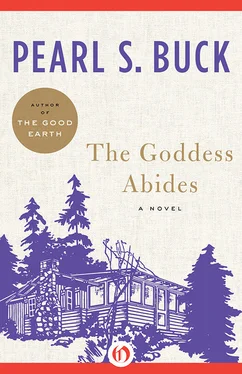The organist was beginning to play the introductory music to marriage, tender music, the mood reverent and subdued. About her the people waited, their faces half smiling as they remembered, each his own remembering. The church was old-fashioned, very simple, almost a country church. Here June had been christened and by the very minister, then young, who was to perform the ceremony. He came in now, wearing his robes. In front of him walked two small boys, choristers, who carried lighted torches. When they reached the altar the small boys lit the candles on either side, and then took their places. The tender music drew to a close. A door to the side of the chancel opened and Jared came in with his best man, someone she did not know, a fellow scientist, he had told her, a brilliant boy of a man, he had said, working in space science. “He lives and breathes on a new level of existence,” Jared had said. “He makes the rest of us look earthbound and old hat.”
She remembered these words, but her eyes were on Jared. He looked abstracted, far away, almost unconcerned. How well she knew that look, how often her mother had complained of her father.
“Raymond! Do you hear a word I’m saying?”
Sometimes, half laughing, her mother said to those about her, “I don’t believe he even heard our marriage ceremony!”
Ah, June must learn to understand this divine abstraction, this cosmic absence! Once, she herself had inquired of a young wife whose young husband had traveled into space.
“Did he come back the same?”
“Not the same,” the young wife had said sadly. “Never quite the same.”
Ah, but June must be proud, not sad! And then, as though at the thought of June, the wedding march broke joyfully across the air. The audience rose and turned to watch the pretty procession, a little girl in a short pink frock walked down the aisle, scattering rose petals, behind her a tiny boy carrying a white satin ring cushion, and then, one after the other, three bridesmaids — young, all so young, all pretty in pink frocks. And at last June in bride’s white, the gleam of satin, the froth of lace, she walking beside her father, her white-gloved hand in his elbow, a tall graying man, still handsome, a famous man in the world, a great man in his way. But none would be greater than Jared. This was her lifework.
Then almost immediately it was over, the ceremony stripped to its essentials.
“I don’t want any nonsense,” Jared had said firmly.
There was no nonsense. The brief vows were said, be came down the aisle, head held high, and June clung to his arm, smiling bravely. A dart of compassion struck her heart. This young wife! It would not be easy to be Jared’s wife. She must think, too, of June, for June unhappy would be a burden Jared must not bear. And yet, she told herself, she must never interfere.
She laughed inside herself. Only a goddess could fulfill all that she was demanding of herself. This, then, was her first task, to make of herself a goddess, the first task and the most difficult. She must set herself apart if she was to fulfill the monumental task, which in itself must be perfection.
Someone, a young man, an usher, came to escort her down the aisle, and she walked to the door and out of the church to her waiting car. An hour’s solitary drive, and she was not lonely, an hour’s solitary drive and she was at the house again, and only when she entered the door did she remember there was a reception somewhere, at June’s home somewhere, a wedding cake to be cut, all of which she had forgotten, as abstracted in her own way as Jared in his, but she had her own dreams. Not to be fulfilled in this house, nor in any other in which she had ever lived! The knowledge came with the suddenness of conviction. She must build herself a house of her own, in the place which she had chosen so blindly, a place by the sea. The plans were where she had put them in a drawer in her desk. She had put them there months ago, not knowing whether she would ever finish them. Now she knew.
She took off her hat and tossed it to a chair. She went to the library, to her desk, and opened the drawer. The plans were there, as she had left them. She sat down and studied them. She could see the house as though it were already standing solitary on the cliff, overlooking the sea. The idea in itself was reality. As Edwin had said, the very idea of immortality made reality. Now the idea of the house, of herself, of Jared, were realities.
She heard a cough at the door. She looked up and saw Weston waiting.
“If you please, madame,” he said, “is there anyone here for dinner?”
“Only I — myself,” she said.












